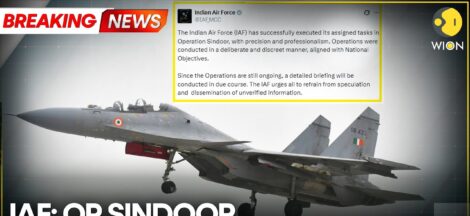India’s move on 23 April 2025 to place the 1960 Indus Waters Treaty into “abeyance” marks a political gesture with no foothold in international law, strategic affairs expert Brahma Chellaney has warned. The decision, triggered by the Pahalgam terror attack in April, halts obligations on paper but may deepen ambiguity in water sharing and escalate bilateral tensions.
New Delhi ceased sharing hydrological data and reserved the right to pursue projects on the Chenab, Jhelum, and Indus rivers—moves symbolic rather than substantive, according to Chellaney. The absence of a legally recognised mechanism for abeyance leaves the action without standing and has triggered an escalating dispute ©.
On 27 June, the Hague-based Court of Arbitration affirmed its competence to adjudicate complaints submitted by Pakistan over India’s Kishanganga and Ratle hydropower projects, despite India’s claim that the court lacks jurisdiction. Pakistan maintains these projects breach treaty parameters and sought arbitration. India promptly denounced the CoA as “illegal” and dismissed its authority, calling its actions a “charade at Pakistan’s behest” ©.
Chellaney points out that while international law does provide for treaty suspension or withdrawal in cases of material breach or fundamental change of circumstances—referencing principles in the Vienna Convention—the term “abeyance” is undefined in such legal frameworks. He argues that this leaves India in a precarious position: the country signals defiance without exercising its lawful options ©.
Pakistan absorbs approximately 70–80 per cent of the basin’s water under the treaty’s design; India controls the eastern rivers and authorised limited use of the western ones. In the intervening months, India has flexed its rights, flushing reservoirs and temporarily withholding data—steps observers see as tactical but ultimately limited in impact without significant infrastructure behind them ©.
Indian government sources have indicated that water release has varied, with occasional reductions to pressure Pakistani agriculture. Islamabad has protested sharply, claiming diminished flow in the Chenab has devastated Kharif crops by up to 20 per cent. They also allege that blockade of data-sharing and infrastructure inspections exacerbate suffering in the agrarian sector ©.
The situation has triggered legal ripples. Pakistan has appealed to the CoA to proceed with arbitration, arguing that treaty suspension is moot because the CoA remains competent. India, however, rejects its jurisdiction entirely, warning that compliance could further embolden Pakistan’s use of terrorism as a foreign-policy tool ©.
Water analysts caution that the treaty’s suspension, even in name, is a climb-down from decades of cooperation and could embolden a future water war amid climate-induced stress. Without formal withdrawal—which under the Vienna Convention would require a 12‑month notice—New Delhi remains in a diplomatic grey zone ©.
India’s stance reflects broader unrest. Since 2001, multiple attacks—including 26 civilians killed in April’s Pahalgam attack—had, in Chellaney’s words, “repudiated India’s generosity” under the treaty. Prime Minister Modi’s government maintains that cooperation cannot flow alongside terror, and thus demands Pakistan cease cross-border militancy before any resumption of water commitments ©.
International legal experts highlight that unilateral treaty alteration could trigger economic and legal challenges. Without consensus, India’s steps risk undermining the treaty’s dispute-resolution framework and hamper downstream stability. Meanwhile, global observers see the situation as a test case in how water diplomacy can unravel when security concerns overshadow technical cooperation.
Pakistan’s ongoing recourse to the CoA underscores its refusal to accept India’s unilateral move. Should arbitration proceed and awards be issued, India may face a difficult choice: comply and concede authority, or persist in non-recognition and risk wider non-compliance consequences.
India, meanwhile, retains only minimal hydrological infrastructure on western rivers. Experts suggest the abeyance thus far has had limited hydraulic impact. Unless New Delhi escalates to withdraw officially or build significant dams and diversion channels, Pakistan may weather the disruption—though prolonged ambiguity could erode trust in broader South Asian water governance.
Strategists suggest a path forward may lie in recalibrating the Indus framework: crafting a conditional treaty linking water flows to verifiable security commitments. That, however, would require a level of bilateral signalling and trust absent in today’s antagonistic environment.




 Locals Coerced Into Aiding Pahalgam Attackers, Says Omar
Locals Coerced Into Aiding Pahalgam Attackers, Says Omar 